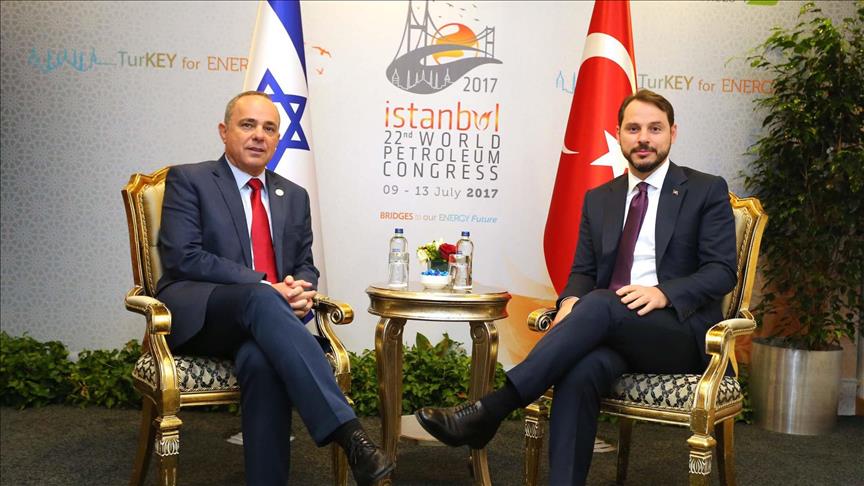Turkey, Israel to try to finalize gas deal by year end
Turkish energy minister is expected to visit Israel by the end of 2017, Israeli energy min. says
 ISTANBUL, TURKEY - JULY 12: Turkish Minister of Energy and Natural Resources Berat Albayrak meets Israeli Minister of Energy Yuval Steinitz (L) in Istanbul, Turkey on July 12, 2017.
( Mehmet Acar - Anadolu Agency )
ISTANBUL, TURKEY - JULY 12: Turkish Minister of Energy and Natural Resources Berat Albayrak meets Israeli Minister of Energy Yuval Steinitz (L) in Istanbul, Turkey on July 12, 2017.
( Mehmet Acar - Anadolu Agency )
By Ebru Sengul
ISTANBUL
Turkey and Israel agreed to try to conclude the inter-governmental umbrella agreement that will enable the construction of the Turkey-Israel pipeline by the end of this year, Israel's Minister of National Infrastructure, Energy and Water Resources, Yuval Steinitz said on Wednesday.
Speaking at the ministerial session organized on the sidelines of 22nd World Petroleum Congress in Istanbul, of which Anadolu Agency is the global communication partner, Steinitz confirmed that he just had a very constructive meeting with his Turkish counterpart, Berat Albayrak.
"We decided after four rounds of talks to accelerate our talks and try to conclude the government-to-government umbrella agreement that will enable the construction of Israel-Turkey pipeline before the end of this year. We are making enormous efforts to conclude it," he said.
"Hopefully Mr. Albayrak will also pay a visit to Israel this year in 2017, which will help us accelerate our attempts to conclude this agreement," he continued.
Steinitz expressed his hopes to realize the visit in the next few months, adding that the two ministers have not fixed a date yet.
On Oct. 13, 2016, Israel's Energy Minister visited Istanbul to attend the World Energy Congress 2016, marking the first visit by Israel after several years.
Albayrak and his Israeli counterpart agreed then to enter talks to discuss the transmission of natural gas from Israeli economic waters through Turkey and on to Europe.
Turkish and Israeli companies are currently discussing the potential gas pipeline project between Israel and Turkey to transport natural gas supplies from the Leviathan gas field in the Mediterranean Sea off the coast of Israel to Europe.
Energy is a token of the reconciliation and dramatic improvement in bilateral relations between Israel and Turkey, according to the Israeli minister.
The East Mediterranean region has several natural gas fields which as yet have not been commercialized via pipelines or LNG facilities, such as the Leviathan field with a capacity of 620 billion cubic meters (bcm) and the Tamar field with 283 bcm in offshore Israel.
The Leviathan field, discovered in 2009, holds an estimated 613 billion cubic meters (bcm) of gas with 39.4 million barrels of condensates. The field is set to begin production in the fourth quarter of 2019.
Steinitz highlighted a scientific exploratory evaluation that reveals that the majority of the significant oil and natural gas reserves in Israeli economic waters have yet to be explored.
"It was evaluated that more than other 2,200 billion cubic meters (bcm) of natural gas have yet to be discovered," he explained.
Looking at Western Europe, the region has got gas from two main sources - Russia in the east and the North Sea fields in the west, Steinitz said.
"But one of them, the North Sea is already on the verge of depletion. Depletion already began and is estimated that in five to six years from now, there will be a sharp decline in natural gas production in the North Sea," he said.
He affirmed that a wider map of reserves would reveal that with the decline in the North Sea and the significant significant discoveries in the East Med, the Eastern Sea could replace resources from the North Sea in decades to come for supplies to Europe.
"The Eastern Mediterranean will become a reliable source of natural gas to Europe in the next three or four decades, he said.
Of the two options - Turkey-Israel pipeline project and the Eastern Mediterranean (EastMed) pipeline project - Steinitz stressed that the Italian government's declaration for the EastMed pipeline project was a "top priority."
The EastMed pipeline project is a European project of common interest, which involves an offshore and onshore natural gas pipeline, directly connecting East Mediterranean resources to Italy and Greece via Southern Cyprus and Crete.
Steinitz said that both projects are "extremely important" and "extremely promising", adding that Israel's existing fields already contain enough natural gas for exports and to justify the two pipelines.
"We have to move simultaneously. To move with new exploration and as you probably have heard we just extended the Israeli bid round for 24 new blocks of exploration until November to attract and also enable more companies from around the world to participate. We have to move simultaneously at the same time on those pipelines because one direction is encouraging the other direction," he added.
- Cyprus issue
On the role of Cyprus for the proposed pipeline between Turkey and Israel, Steinitz said they have very good relations with Turkey, Greece, Southern Cyprus and other countries in the Mediterranean.
"Hopefully this region will find its way in the future to cooperate and to establish good relations with all countries. We are working with the Turkish government on Israel-Turkish relations in general, and on this particular project.
"We are working with the governments of Italy, Greece and Southern Cyprus about a cross-Mediterranean pipeline. I do not see any collusion here. I think these are very important projects for all sides and I do not want to make priorities. We are making efforts to advance these important energy projects," he added.


